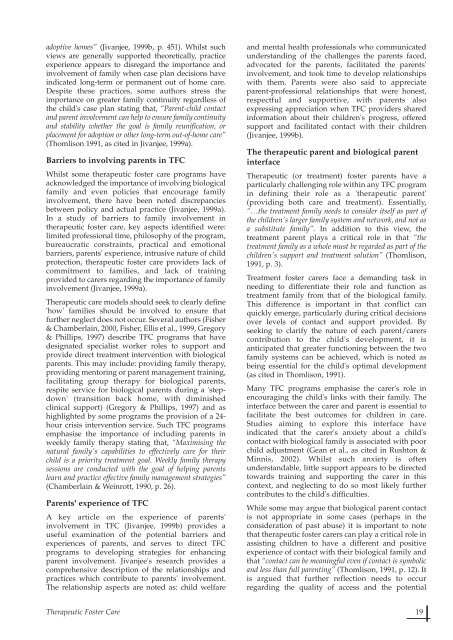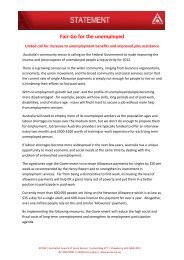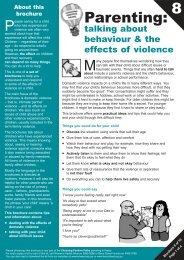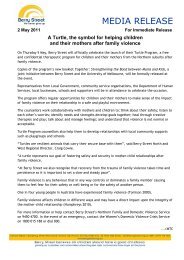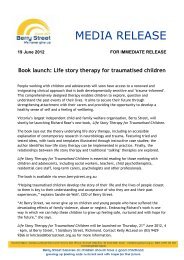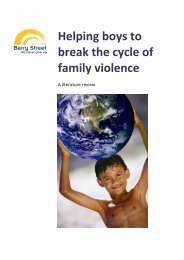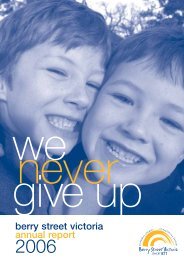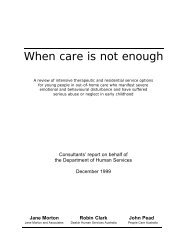Therapeutic foster care - Berry Street Childhood Institute
Therapeutic foster care - Berry Street Childhood Institute
Therapeutic foster care - Berry Street Childhood Institute
Create successful ePaper yourself
Turn your PDF publications into a flip-book with our unique Google optimized e-Paper software.
adoptive homes” (Jivanjee, 1999b, p. 451). Whilst such<br />
views are generally supported theoretically, practice<br />
experience appears to disregard the importance and<br />
involvement of family when case plan decisions have<br />
indicated long-term or permanent out of home <strong>care</strong>.<br />
Despite these practices, some authors stress the<br />
importance on greater family continuity regardless of<br />
the child's case plan stating that, “Parent-child contact<br />
and parent involvement can help to ensure family continuity<br />
and stability whether the goal is family reunification, or<br />
placement for adoption or other long-term out-of-home <strong>care</strong>”<br />
(Thomlison 1991, as cited in Jivanjee, 1999a).<br />
Barriers to involving parents in TFC<br />
Whilst some therapeutic <strong>foster</strong> <strong>care</strong> programs have<br />
acknowledged the importance of involving biological<br />
family and even policies that encourage family<br />
involvement, there have been noted discrepancies<br />
between policy and actual practice (Jivanjee, 1999a).<br />
In a study of barriers to family involvement in<br />
therapeutic <strong>foster</strong> <strong>care</strong>, key aspects identified were:<br />
limited professional time, philosophy of the program,<br />
bureaucratic constraints, practical and emotional<br />
barriers, parents' experience, intrusive nature of child<br />
protection, therapeutic <strong>foster</strong> <strong>care</strong> providers lack of<br />
commitment to families, and lack of training<br />
provided to <strong>care</strong>rs regarding the importance of family<br />
involvement (Jivanjee, 1999a).<br />
<strong>Therapeutic</strong> <strong>care</strong> models should seek to clearly define<br />
'how' families should be involved to ensure that<br />
further neglect does not occur. Several authors (Fisher<br />
& Chamberlain, 2000, Fisher, Ellis et al., 1999, Gregory<br />
& Phillips, 1997) describe TFC programs that have<br />
designated specialist worker roles to support and<br />
provide direct treatment intervention with biological<br />
parents. This may include: providing family therapy,<br />
providing mentoring or parent management training,<br />
facilitating group therapy for biological parents,<br />
respite service for biological parents during a 'stepdown'<br />
(transition back home, with diminished<br />
clinical support) (Gregory & Phillips, 1997) and as<br />
highlighted by some programs the provision of a 24-<br />
hour crisis intervention service. Such TFC programs<br />
emphasise the importance of including parents in<br />
weekly family therapy stating that, “Maximising the<br />
natural family's capabilities to effectively <strong>care</strong> for their<br />
child is a priority treatment goal. Weekly family therapy<br />
sessions are conducted with the goal of helping parents<br />
learn and practice effective family management strategies”<br />
(Chamberlain & Weinrott, 1990, p. 26).<br />
Parents' experience of TFC<br />
A key article on the experience of parents'<br />
involvement in TFC (Jivanjee, 1999b) provides a<br />
useful examination of the potential barriers and<br />
experiences of parents, and serves to direct TFC<br />
programs to developing strategies for enhancing<br />
parent involvement. Jivanjee's research provides a<br />
comprehensive description of the relationships and<br />
practices which contribute to parents' involvement.<br />
The relationship aspects are noted as: child welfare<br />
and mental health professionals who communicated<br />
understanding of the challenges the parents faced,<br />
advocated for the parents, facilitated the parents'<br />
involvement, and took time to develop relationships<br />
with them. Parents were also said to appreciate<br />
parent-professional relationships that were honest,<br />
respectful and supportive, with parents also<br />
expressing appreciation when TFC providers shared<br />
information about their children's progress, offered<br />
support and facilitated contact with their children<br />
(Jivanjee, 1999b).<br />
The therapeutic parent and biological parent<br />
interface<br />
<strong>Therapeutic</strong> (or treatment) <strong>foster</strong> parents have a<br />
particularly challenging role within any TFC program<br />
in defining their role as a 'therapeutic parent'<br />
(providing both <strong>care</strong> and treatment). Essentially,<br />
“…the treatment family needs to consider itself as part of<br />
the children's larger family system and network, and not as<br />
a substitute family”. In addition to this view, the<br />
treatment parent plays a critical role in that “the<br />
treatment family as a whole must be regarded as part of the<br />
children's support and treatment solution” (Thomlison,<br />
1991, p. 3).<br />
Treatment <strong>foster</strong> <strong>care</strong>rs face a demanding task in<br />
needing to differentiate their role and function as<br />
treatment family from that of the biological family.<br />
This difference is important in that conflict can<br />
quickly emerge, particularly during critical decisions<br />
over levels of contact and support provided. By<br />
seeking to clarify the nature of each parent/<strong>care</strong>rs<br />
contribution to the child's development, it is<br />
anticipated that greater functioning between the two<br />
family systems can be achieved, which is noted as<br />
being essential for the child's optimal development<br />
(as cited in Thomlison, 1991).<br />
Many TFC programs emphasise the <strong>care</strong>r's role in<br />
encouraging the child's links with their family. The<br />
interface between the <strong>care</strong>r and parent is essential to<br />
facilitate the best outcomes for children in <strong>care</strong>.<br />
Studies aiming to explore this interface have<br />
indicated that the <strong>care</strong>r's anxiety about a child's<br />
contact with biological family is associated with poor<br />
child adjustment (Gean et al., as cited in Rushton &<br />
Minnis, 2002). Whilst such anxiety is often<br />
understandable, little support appears to be directed<br />
towards training and supporting the <strong>care</strong>r in this<br />
context, and neglecting to do so most likely further<br />
contributes to the child's difficulties.<br />
While some may argue that biological parent contact<br />
is not appropriate in some cases (perhaps in the<br />
consideration of past abuse) it is important to note<br />
that therapeutic <strong>foster</strong> <strong>care</strong>rs can play a critical role in<br />
assisting children to have a different and positive<br />
experience of contact with their biological family and<br />
that “contact can be meaningful even if contact is symbolic<br />
and less than full parenting” (Thomlison, 1991, p. 12). It<br />
is argued that further reflection needs to occur<br />
regarding the quality of access and the potential<br />
<strong>Therapeutic</strong> Foster Care 19


